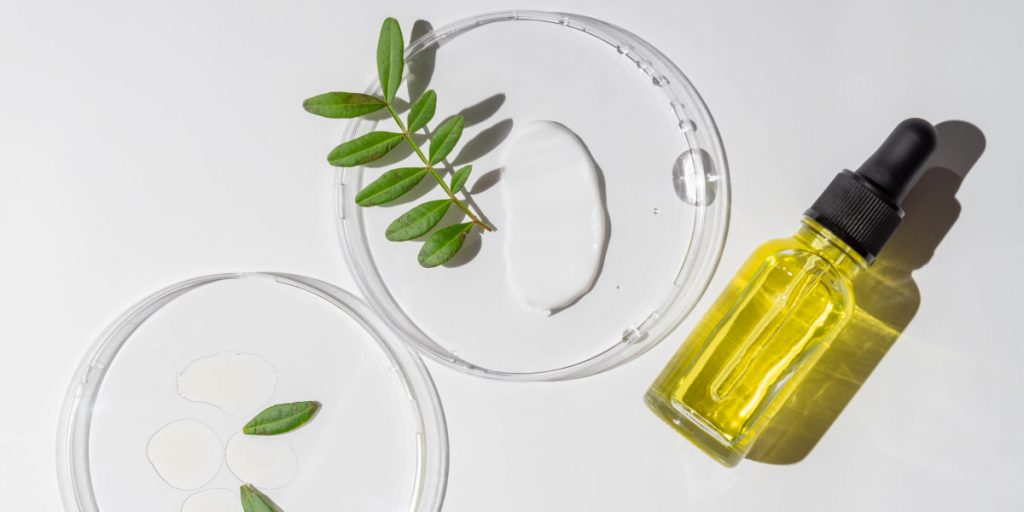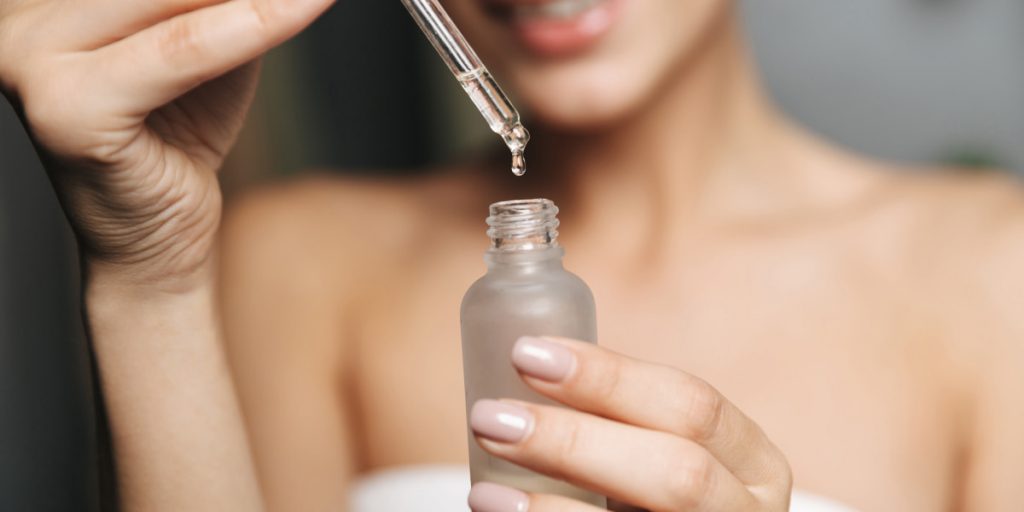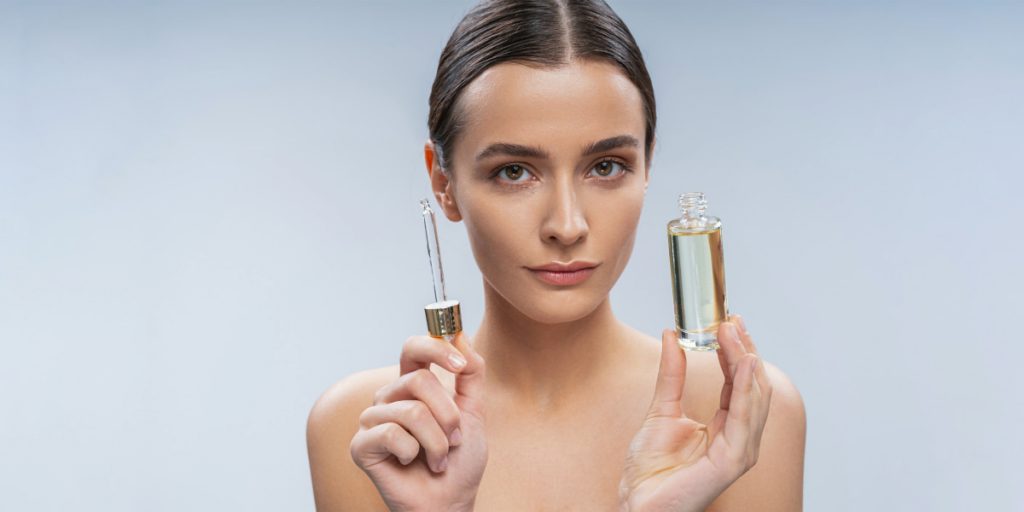Published on October 6th, 2023
Last updated on October 6th, 2023
Vitamin C Serum: Which One To Choose?

Vitamin C serum is now a well-liked skincare item. All because of its capacity to enhance the skin’s appearance and deliver advantages. People frequently use vitamin C serum as their main daily skin care product for a variety of factors. They include everything from reducing wrinkles to environmental protection.
Choosing a serum might be challenging because there are so many varieties available. The potency of a vitamin C serum can depend on its stability and concentration.
In this article, we will look at ways how to brighten skin with vitamin C. We will highlight important points when choosing the right vitamin serum. The advantages and applications of vitamin C serum will highlight. Additionally, you will discover which product is ideal for your particular skin type. The guide will help you navigate the vitamin C serums market and determine the best choice.
What is Vitamin C?

Vitamin C, also known as ascorbic acid, is a water-soluble vitamin. It’s essential for the normal growth and development of the human body. It is an antioxidant that helps protect cells from damage. These are caused by free radicals, which produce when the body breaks down food or exposes to environmental toxins such as pollution or radiation.
Vitamin C involves in biological processes, including the synthesis of collagen. It is a major component of skin, tendons, ligaments, and other connective tissues. It is also essential for the synthesis of neurotransmitters such as serotonin. These regulate mood and the metabolism of some amino acids.
Vitamin C finds in a variety of fruits and vegetables. Citrus fruits, strawberries, kiwi fruit, tomatoes, broccoli and red/green peppers have the most vitamin C. It is also available as a dietary supplement in the form of tablets, capsules, and powders.
How does Vitamin C work?
Vitamin C serum acts as an antioxidant in the body. That is, it helps neutralize free radicals and protect cells from damage. Free radicals are molecules that form as a normal byproduct of cellular metabolism. They can also produce environmental toxins. They can cause cell damage and associate with the development of various diseases. Among the diseases worth mentioning are cancer, heart disease, and Alzheimer’s.
Vitamin C helps neutralize free radicals by giving them electrons. This makes them less reactive and less likely to cause harm. Also to its antioxidant properties, vitamin C involves in some biological processes. For example, the need for protein synthesis. It is a major component of skin, tendons, ligaments, and other connective tissues. It also contributes to better absorption of iron from plant foods. The vitamin plays a role in the metabolism of some amino acids and neurotransmitters.
The human body cannot produce its vitamin C. So, it must get through diet or supplements. People can get enough vitamin C from a diet that includes a variety of fruits and vegetables. But some people may need to take supplements to meet their daily needs.
What are the benefits of Vitamin C for your skin?
Many advantages of vitamin C for the skin include:
- Boosting collagen production
Vitamin C is necessary for collagen production. It gives the skin structure and flexibility. Collagen can enhance skin texture and reduce wrinkles.
- Protecting against sun damage
Vitamin C’s antioxidant capabilities can help protect the skin from UV radiation damage. By doing so, the risk of skin cancer, sunburns, and early aging can reduce.
- Brightening the complexion
Vitamin C can help make even skin tone and brighten skin. It minimizes the visibility of dark spots and hyperpigmentation.
- Fighting inflammation
Vitamin C’s anti-inflammatory properties help to decrease skin irritability. Certain skin conditions, such as rosacea, eczema, and acne, may become worse as a result.
- Enhancing wound healing
Vitamin C is essential for the process of wound healing. Because it plays a role in the production of collagen. Vitamin C application promotes healing and reduces the possibility of scarring.
How to integrate Vitamin C serum into your skincare routine?

If you’re interested in incorporating a vitamin C serum into your skincare routine, here are some steps you can follow:
- Start with dry, clean skin. Use a soft cleanser to wash your face, then pat it dry with a fresh towel.
- Apply toner if desired. If you use a toner, apply it to your face and let it dry completely before continuing.
- Use a vitamin C serum. Apply a tiny quantity of serum to your fingertips using the dropper or pump. After that, rub your face and neck with it. Start with a small quantity since using too much too might irritate certain people.
- Await its absorption. Give the serum time to completely seep into your skin. Usually, this takes a few minutes.
- Moisturize your skin. Apply your preferred moisturizer once the serum absorbs to seal in the moisture.
- Apply sunscreen in the morning. Use broad-spectrum sunscreen with SPF 30 or higher.
How to apply Vitamin C?
Vitamin C can apply topically to the skin or taken orally as a supplement. Here are some guidelines for each method:
| Topical application | Oral supplements |
| Face cleaning. First, wash and dry your face. Cleanse your skin with a mild cleanser to get rid of any dirt, oil, or makeup, and then pat your skin dry. Put a little Vitamin C on your skin. Apply a tiny quantity of Vitamin C serum or lotion to your face and neck using your hands. Start with a little quantity since using too much too might irritate certain people. On your skin, massage it in. Use circular movements to massage the vitamin C into your skin. Be careful to keep the eye region clear. Await its absorption. Give the vitamin C time to completely enter your skin. Usually, this takes a few minutes. Apply sunscreen and/or moisturizer. After the vitamin C has had time to absorb, apply moisturizer and/or sunscreen to your skin. This way you moisturize and protect your skin. | Observe the dose recommendations. Tablets, pills, and powders are just a few of the varieties of vitamin C supplements that offer. Pay attention to the dose recommendations made by your doctor or on the label of the medication. Drink it while eating. Vitamin C pills should take with meals or a glass of water to prevent stomach distress. Be dependable. It’s crucial to constantly take vitamin C pills as recommended if you want to get the advantages. |
When is it better to use Vitamin C serum?
The morning is the best time to use a vitamin C serum. This might shield your skin from solar damage brought on by UV rays. Free radical damage from UV radiation is a potential cause of early aging, black patches, and uneven skin tone. The antioxidant properties of vitamin C can aid in scavenging free radicals.
Applying a vitamin C serum at night will make your skin seem more radiant in the morning. Additionally, it will give your skin a radiant glow. Vitamin C is well known for its ability to control and even out skin tone. It reduces the appearance of hyperpigmentation and dark patches.
But go ahead if using a vitamin C serum at night is more convenient for your beauty regimen. Afterward, What should you look for in a Vitamin C serum?
What should you look for in a Vitamin C serum?

There are several considerations to weigh while choosing a serum. You can choose a high-quality, risk-free product. It should be perfect for your skin by following them. Here are a few issues to be on the lookout for:
- Stable form of Vitamin C;
- Concentration;
- Other active ingredients;
- Packaging;
- pH level;
- Quality and reputation of the brand.
Two types of Vitamin C
Strong antioxidant vitamin C has many positive effects on the body and skin. L-ascorbic acid and vitamin C derivatives are the two main types of vitamin C. They are the ones that use in skin care. Let’s examine them more closely.
L-ascorbic acid
The water-soluble form of vitamin C calls L-ascorbic acid. It works well to lighten the skin, lessen hyperpigmentation, and promote the formation of collagen. Strong antioxidant L-ascorbic acid aids in the elimination of free radicals. These have the potential to harm the skin and speed up aging. It needs for the synthesis of the protein collagen, which keeps the skin elastic and tight.
When L-ascorbic acid exposes to air, light, and heat, it can become unstable and readily oxidize. When applied to the skin, this may lessen its efficacy and increase sensitivity. To stop oxidation, L-ascorbic acid is frequently mixed withmorel antioxidants. Once packaged, the containers are opaque and sealed.
Vitamin C derivatives
There are several other compounds of vitamin C used in cosmetics. Compared to L-ascorbic acid, these compounds are frequently more stable and less irritating. They are so a wonderful choice for those who have sensitive skin. The most widely used derivatives of vitamin C list below:
- Ascorbyl palmitate.
- Magnesium ascorbyl phosphate.
- Sodium ascorbyl phosphate.
- Tetrahexyldecyl ascorbate.
Concentration
An essential element is the vitamin C serum concentration. It should take into consideration while selecting a product. Vitamin C may provide greater skin benefits due to its concentration. But it also makes sensitivity and irritability more likely. Consider the following when calculating the serum’s vitamin C concentration:
- 10% of the total. This is a great place to start if you’ve never used vitamin C before. It has the potential to benefit the skin in some ways without severely irritating it.
- 15% to 20% attention. This has benefits for the skin, such as improved brightness and less hyperpigmentation.
- A concentration of at least 25%. It’s possible that a serum with a concentration of 25% or more may help the skin the best. The even skin tone’s quality, evenness, and texture all substantially improve.
What Vitamin C is best for your skin type:

When it comes to choosing a vitamin C skin care product, consider the concentration. Also, keep in mind your specific skin type and concerns. Different forms of vitamin C may be more effective or suitable for certain skin types. So, it is important to choose exactly what you need. In this regard, understanding your skin type and its unique characteristics is crucial to making an informed decision about choosing the best product.
Dry skin
| Features of dry skin | Benefits of 20% Vitamin C Serum |
| Rough, flaky, or scaly skin texture Tightness or discomfort after bathing or swimming Skin that looks dull or ashy Fine lines and wrinkles may be more visible Itching or irritation Redness or inflammation Skin that appears thin or fragile | Brightening Antioxidant protection Collagen production Hydration Smoothing and firming |
You might wish to seek a vitamin C serum if you have dry skin. It could include hydrating substances like hyaluronic acid or glycerin. These components aid in moisturizing and hydrating the skin. Those who have dry skin may find this to be extremely beneficial.
The RE’ EQUIL C20 VCIP 20% Vitamin C Serum is one item that may work for those with dry skin. Tetrahexyldecyl ascorbate (VCIP) is a stable form of vitamin C that is present in this serum. It can give long-lasting antioxidant protection by penetrating deeply into the skin. Hyaluronic acid, which is also present, can aid in enhancing the texture of the skin.
Apply a small amount of the serum in the morning or evening to clean dry skin. Circular upward strokes use to massage the serum into your skin until it is fully absorbed. To shield your skin against UV deterioration, use a broad-spectrum sunscreen.
Oily skin
| Features of oily skin | Benefits of 10% Vitamin C Serum |
| Shiny appearance Enlarged pores Acne and breakouts Thick skin texture Makeup doesn’t last Tendency to shine throughout the day | Brightening and evening out skin tone Providing antioxidant protection Reducing excess oil production Hydrating and moisturizing the skin |
If you have oily skin, you might want to seek a lightweight, non-greasy vitamin C serum. A serum with a reduced vitamin C content is a more option. This may be necessary for you to prevent breakouts and excessive oiliness.
For those with oily skin, RE’ EQUIL C10 SAP 10% Vitamin C Serum can be a good option. A stable form of vitamin C called SAP (sodium ascorbyl phosphate) is present in the serum. In comparison to other forms of vitamin C, it is less prone to produce rashes and irritation. Niacinamide, which can aid in regulating sebum production, is also present.
Take a tiny amount of the serum, and then gently pat it onto your clean, dry skin. Both the morning and the evening are preferable. Circularly massaging the serum upward will ensure total absorption. It’s advised to wear broad-spectrum sunscreen during the day. The skin is indeed shielded from UV rays by this.
Normal skin
| Features of normal skin | Benefits of 15% Vitamin C Serum |
| Well-balanced skin Even texture Small pores Good elasticity Fewer wrinkles and fine linesNo sensitivity Healthy complexion | Improves skin brightness and radiance Reduces dark spots and hyperpigmentation Provides long-lasting protection against environmental damage Hydrates and nourishes the skin Reduces the appearance of fine lines and reduce wrinkles |
For people with regular skin, there are some vitamin C serum options available. They could improve the glow and health of your skin. Choose a serum whose components are well-balanced. It should also include a reasonable amount of vitamin C.
The RE’ EQUIL C15 EAA 15% Vitamin C Serum is one such product that could be effective for those with normal skin. The serum contains ethyl ascorbic acid (EAA), a stable form of vitamin C. It shows promise in enhancing skin brightness and minimizing uneven skin tone. The product also contains ferulic acid and vitamin E. They assist in protecting against the damaging effects of the environment.
On clean, dry skin, apply a tiny quantity of the serum either in the morning or at night. Gently rub the serum in upward circular motions to help it absorb completely. To prevent UV rays from harming your skin, wear sunscreen with a broad spectrum.
The moderate vitamin C concentration of this serum makes it a good option for those with normal skin. But before using any product, it is always advised to perform a patch test on a small area of your skin. You can be sure that it won’t frighten or upset sensitive folks in this way.
How to store your Vitamin C serum?

Vitamin C serums are a popular addition to many skincare treatments. But, proper storage of vitamin C serums is important. It is necessary for the product to remain effective and not break down quickly. Factors such as light, heat, and exposure to air can affect the stability and potency of vitamin C. This can eventually lead to a decrease in the effectiveness of the serum. In this context, it’s essential to learn how to brighten skin with Vitamin C serum to make the most out of its benefits. Here are some tips on how to store your Vitamin C serum:
- Keep it in a cool, dark place
Exposure to light and heat can cause Vitamin C to degrade quickly. So it’s best to store your serum in a cool, dark place like a medicine cabinet or drawer.
- Keep the lid tightly closed
Oxygen can also cause Vitamin C to break down, so make sure the lid of your serum bottle is tightly closed when not in use.
- Avoid exposure to air
Air can also degrade Vitamin C, so try to avoid leaving the serum bottle open for too long.
- Use it up within the recommended time frame
Serums have a shelf life of 3-6 months, so try to use it up within this time frame to ensure maximum effectiveness.
- Avoid using your fingers to apply the serum
Bacteria from your hands can contaminate the serum and cause it to spoil quickly. Instead, use a clean dropper or a pump to dispense the serum.
- Do not mix Vitamin C serum with other active ingredients
Mixing Vitamin C serum with other active ingredients, such as AHAs or BHAs, can alter its pH level and effect. So, it’s best to avoid mixing it with other products.
Bottom Line
Choosing the right vitamin C serum can make a big difference in the health of your skin. Choose the right product for your skin type and expect unreal results on how to brighten your skin! Consider factors such as concentration, composition, and stability when choosing a serum. Always consult your doctor if you have questions or concerns.
FAQs:
Should I refrigerate vitamin C serum?
Yes. This is because vitamin C is an unstable molecule that can destroy by light, air, and heat. This causes the serum to lose its effectiveness over time. Also, the cool temperature helps to soften and soothe the skin when applying the serum.
How long does it take vitamin C serum to work?
The duration of action of a vitamin C serum can vary depending on such factors:
The concentration of vitamin C in the serum;
Frequency of application;
The type of skin and the problems the person is experiencing.
A vitamin C serum will begin to show visible results after a few weeks/months of continuous use.
What does vitamin C do?
Vitamin C is an essential nutrient that plays many important roles in the body. Here are some of the ways that vitamin C benefits the body:
Acts as an antioxidant.
Boosts immune function.
Promotes collagen production.
Enhances iron absorption.
Improves skin health.
Reduces the risk of chronic diseases.
How much vitamin C is too much?
The recommended daily intake of vitamin C depends on age, gender, and other factors. Here are the daily intake recommendations for vitamin C:
Infants (0-6 months): 40 milligrams (mg);
Infants (7-12 months): 50 mg;
Children (1-3 years): 15 mg;
Children (4-8 years): 25 mg;
Children (9-13 years): 45 mg;
Adolescents (14-18 years): 65-75 mg;
Adults (19 years and older): 75-90 mg for women, 90 mg for men;
Pregnant women: 85 mg;
Breastfeeding women: 120 mg.


